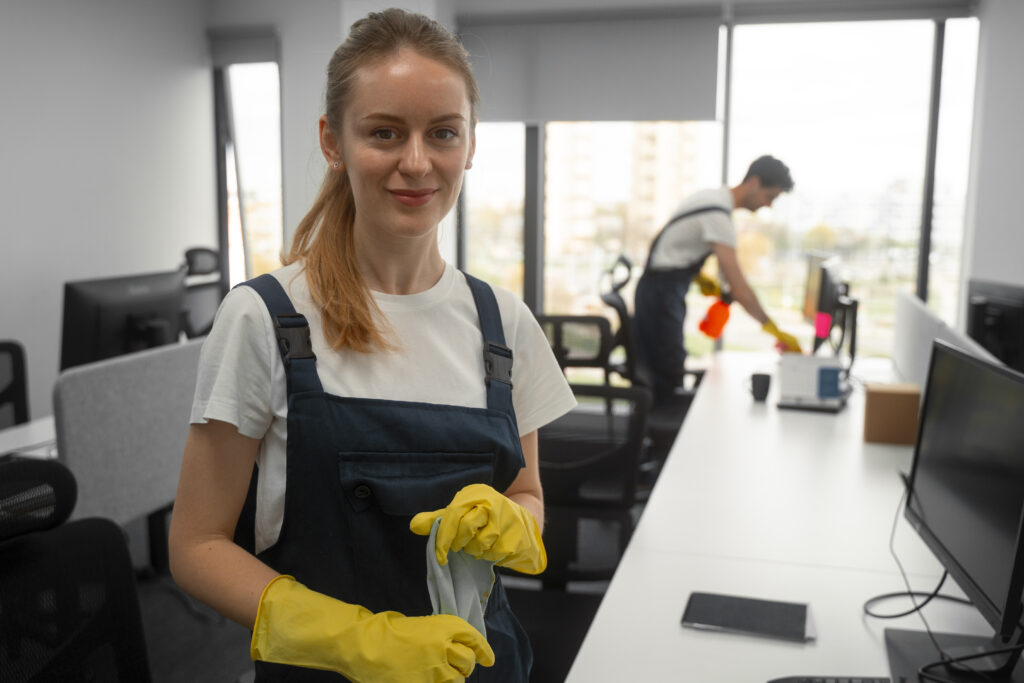Having a cluttered office can negatively affect productivity and increase stress. Removing unnecessary items and organizing your workspace can lead to a cleaner, healthier environment. An orderly desk makes it easier to find essential items, helping you work more efficiently and with less frustration.
Clutter can be overwhelming, but taking small steps can make a big difference. Start by sorting through papers, supplies, and personal items. Create designated spaces for these categories to keep them organized. This simple practice can help maintain cleanliness and support a focused work atmosphere.
Beyond improving productivity, a clutter-free office can have positive effects on health. Less mess reduces distractions and lowers the risk of tripping or other accidents. A cleaner space can also minimize dust and allergens, promoting a healthier workplace for everyone.
Analyzing Office Clutter
A cluttered office can cause stress and hamper productivity. Understanding the main causes of clutter and its effects on work life can help create a cleaner, more efficient workspace.
Identifying Common Clutter Culprits
Many items contribute to office clutter. Paperwork is one of the main culprits, including old files, unnecessary copies, and outdated notes. Office supplies, such as pens, paper clips, and sticky notes, are often scattered. Personal items like coffee mugs, photos, and decorations can also pile up.
Digital clutter is another concern. Excessive emails, downloaded files, and scattered digital notes can make it hard to find what you need.
Recognizing these clutter sources is the first step in creating a tidier office space.
The Impact of Clutter on Productivity and Stress
Clutter can significantly impact productivity and stress levels. Visual distractions make it hard to focus on important tasks. Searching for misplaced items wastes time and energy.
A messy workspace can increase anxiety and stress, making it harder to work efficiently. Studies have shown that people are more productive in clean, organized environments because they can focus better and feel less overwhelmed.
Clutter Versus Necessary Items
It’s important to distinguish between clutter and necessary items. Essential items include computers, notebooks, and specific tools required for daily tasks.
To reduce clutter, evaluate each item’s usefulness. Ask if it serves a current purpose. If not, it’s likely clutter. This helps to keep only what’s necessary, ensuring the workspace remains functional and efficient.
Regularly sorting and organizing can maintain a balance between essential tools and unnecessary clutter, leading to a cleaner and more productive office.
Strategies for Decluttering
Organizing an office space involves practical steps, such as setting up filing systems, going paperless, making better use of vertical storage, and following specific methodologies like Marie Kondo’s.
Implementing a Filing System
A clear filing system is key for keeping documents tidy. Employees should use folders, labels, and filing cabinets. Color-coding folders can help in sorting by type or priority.
Well-labeled cabinets make it easier to find important paperwork. Regularly going through files to remove outdated documents also helps in keeping the system efficient.
Digitizing Paperwork
Switching to digital files reduces paper clutter significantly. Scanners can convert paper documents into electronic files. These can then be organized into folders on a computer.
Utilizing cloud storage ensures that documents are safe and accessible from anywhere. Going paperless not only saves space but also supports easy sharing and collaboration.
Utilizing Vertical Space
Using the vertical space in an office can greatly increase storage options. Shelves and wall-mounted organizers help keep items off desks. Tall filing cabinets can also store more without taking up too much floor space.
Pegboards or magnetic boards can hold office tools, freeing up desk drawers. This approach maximizes efficiency and keeps the area looking neat.
Adopting Marie Kondo’s Methodology
Marie Kondo’s approach to decluttering focuses on keeping only items that “spark joy.” This method involves going through each item and deciding its value.
It encourages not just tidiness but also mindful retention. Employees are advised to work through categories like paperwork and office supplies, retaining only what is truly necessary or inspirational.
Maintaining a Decluttered Office
Keeping a clean and tidy office requires regular cleaning, efficient storage solutions, and behavioral changes. These practices help control clutter and maintain an organized workspace.
Regular Cleaning Schedules
A consistent cleaning schedule is key. Daily tasks should include clearing off desks and putting away unused office supplies. Weekly tasks might involve dusting surfaces, emptying trash bins, and organizing files. For monthly tasks, focus on deeper cleaning areas like common spaces, carpets, and vent covers.
Maintaining a routine makes it easier to control clutter and keep the office clean. Everyone should follow the schedule, making teamwork essential. Maintaining cleanliness prevents the buildup of unnecessary items.
Efficient Storage Solutions
Effective storage helps maintain a decluttered office. Shelving units, filing cabinets, and storage bins play a crucial role. Use shelves to store items you use frequently. Filing cabinets can keep your documents organized and easily accessible.
Labeling is crucial for quick retrieval. Use labels for drawers, boxes, and folders. Consider investing in cable management products to keep cords tidy. Implementing vertical storage can save floor space.
Behavioral Changes for Sustained Tidiness
Changing habits is important to sustain tidiness. Encourage employees to put items back in their place after use. Avoid keeping items on desks that aren’t used daily. Encourage a policy of removing one old item when a new item is brought in.
Keeping a decluttered office is easier when everyone takes part. Regular checks can help identify problem areas and prevent clutter from accumulating. Small, consistent efforts can make a big difference.

